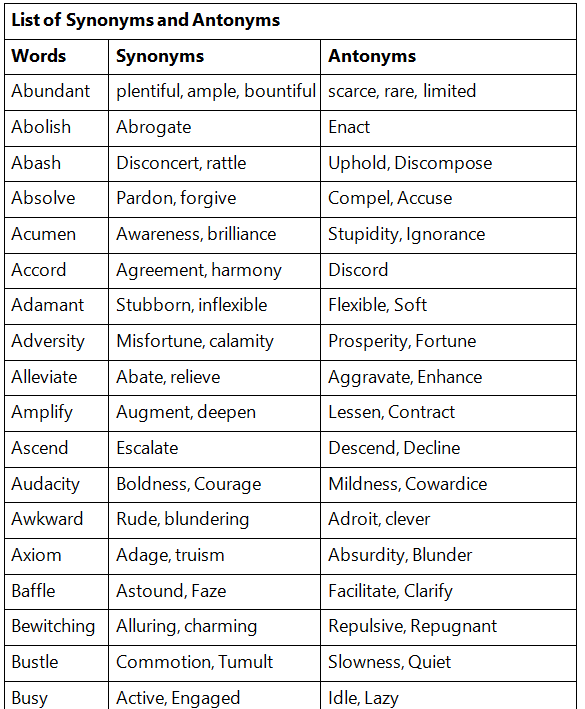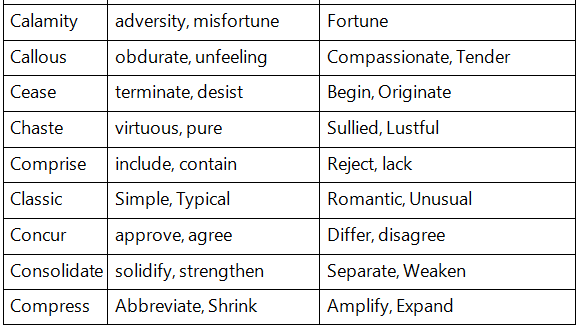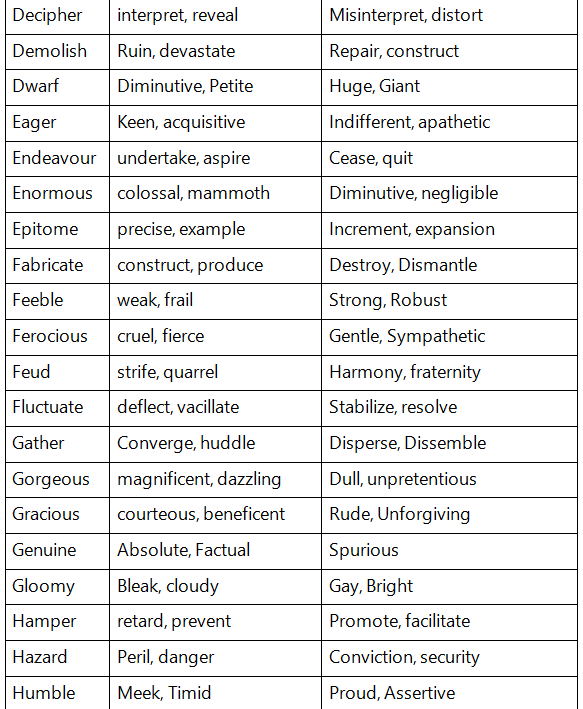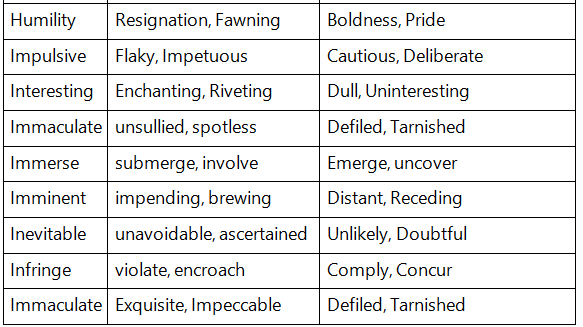Synonyms and Antonyms Tips and Tricks for Government Exams
| Table of contents |

|
| Introduction |

|
| Importance of Synonyms and Antonyms in Competitive Exams |

|
| What are Synonyms? |

|
| What are Antonyms? |

|
| Synonyms and Antonyms List |

|
| Synonyms and Antonyms Examples |

|
Introduction
Synonyms and Antonyms are vital components of vocabulary that significantly contribute to a candidate’s performance in competitive exams. They are commonly asked in exams like SSC CGL, SSC CHSL, Bank PO, and Clerk exams, often appearing in the English Language section. Mastering this topic not only improves accuracy in exams but also enhances overall command of the English language.
Importance of Synonyms and Antonyms in Competitive Exams
In exams such as SSC CGL, SSC CPO, SSC CHSL, IBPS PO, SBI Clerk, and various Railway exams, questions on Synonyms and Antonyms are used to evaluate a candidate’s vocabulary strength and language comprehension. A good grasp of word meanings—along with their similar and opposite forms—can significantly improve a candidate’s score. Regular practice in this area not only aids in solving direct questions but also supports reading comprehension and effective communication.
What are Synonyms?
Synonyms are words or phrases that have the same or nearly same meaning as another word or phrase. It can be used in a sentence to avoid repetition, without losing the actual meaning of it. Here are some synonyms examples to aid you in understanding it more clearly.
Synonym examples:
- Abate: Moderate
- Ascend: Escalate
- Cunning: Smart
- Dwarf: Petite
What are Antonyms?
Antonyms are the words/phrases that have opposite meanings as another word or phrase. Here are some examples of Antonyms for your reference.
Antonyms examples:
- Abate: Aggravate
- Ascend: Descend, Decline
- Cunning: Naive
- Dwarf: Huge
Synonyms and Antonyms List
As we have mentioned, Synonyms and Antonyms are not only important for SSC exams but for all the competitive exams. Thus, candidates who want to land a government job must go through the Synonyms and Antonyms list to fetch maximum marks from the English section.



Synonyms and Antonyms Examples
To get a better clarity on the usage of Synonyms and Antonyms in sentences, take a look at the examples below:
She was happy to receive the award.
Synonym: Glad, Elated
Antonym: UnhappyHis brave actions saved the child.
Synonym: Courageous, Fearless, Reckless
Antonym: FearfulThe room was clean and well-organized.
Synonym: Neat, Tidy, Spotless
Antonym: DirtyHe is a very honest person.
Synonym: Truthful, Sincere, Upright
Antonym: DishonestThe teacher appreciated her intelligent answer.
Synonym: Smart, Bright, Clever
Antonym: DullThe old man walked slowly down the road.
Synonym: Elderly, Aged, Senior
Antonym: YoungThey decided to cancel the event due to rain.
Synonym: Call off, Abort, Terminate
Antonym: Proceed, ContinueShe always speaks in a polite manner.
Synonym: Courteous, Respectful, Gracious
Antonym: RudeThe mountain view was absolutely beautiful.
Synonym: Lovely, Stunning, Gorgeous
Antonym: UglyHe accepted the offer without hesitation.
Synonym: Agreed, Approved, Consented
Antonym: Rejected, Declined
|
66 videos|253 docs
|
FAQs on Synonyms and Antonyms Tips and Tricks for Government Exams
| 1. What are synonyms and antonyms? |  |
| 2. How can synonyms and antonyms enhance writing? |  |
| 3. What are some tips for effectively using synonyms and antonyms? |  |
| 4. Can synonyms and antonyms be used interchangeably? |  |
| 5. How can one improve their vocabulary using synonyms and antonyms? |  |





















